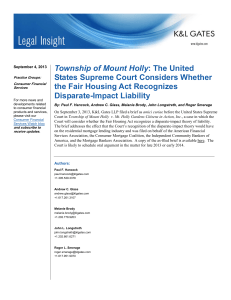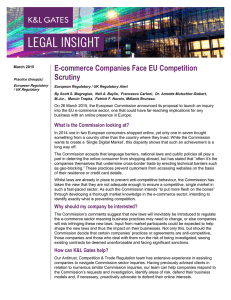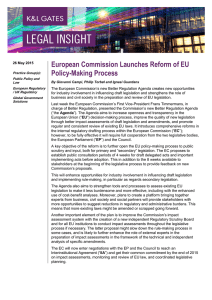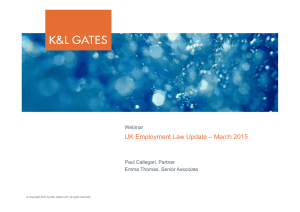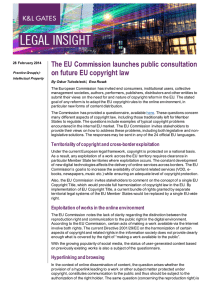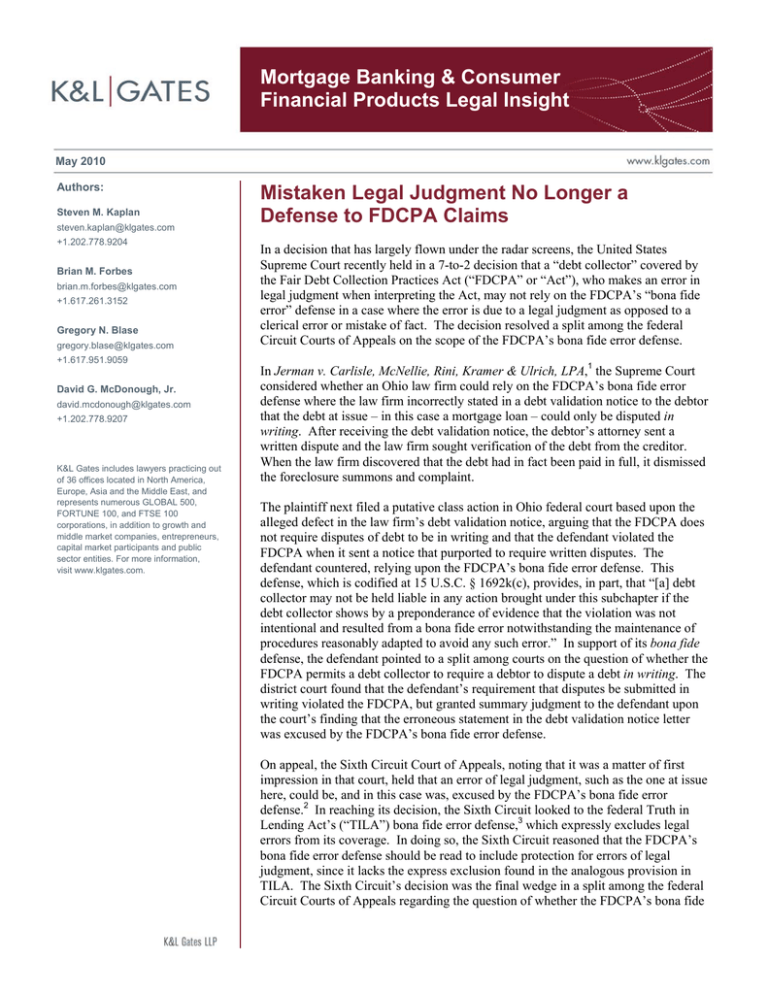
Mortgage Banking & Consumer
Financial Products Legal Insight
May 2010
Authors:
Steven M. Kaplan
steven.kaplan@klgates.com
+1.202.778.9204
Brian M. Forbes
brian.m.forbes@klgates.com
+1.617.261.3152
Gregory N. Blase
gregory.blase@klgates.com
+1.617.951.9059
David G. McDonough, Jr.
david.mcdonough@klgates.com
+1.202.778.9207
K&L Gates includes lawyers practicing out
of 36 offices located in North America,
Europe, Asia and the Middle East, and
represents numerous GLOBAL 500,
FORTUNE 100, and FTSE 100
corporations, in addition to growth and
middle market companies, entrepreneurs,
capital market participants and public
sector entities. For more information,
visit www.klgates.com.
Mistaken Legal Judgment No Longer a
Defense to FDCPA Claims
In a decision that has largely flown under the radar screens, the United States
Supreme Court recently held in a 7-to-2 decision that a “debt collector” covered by
the Fair Debt Collection Practices Act (“FDCPA” or “Act”), who makes an error in
legal judgment when interpreting the Act, may not rely on the FDCPA’s “bona fide
error” defense in a case where the error is due to a legal judgment as opposed to a
clerical error or mistake of fact. The decision resolved a split among the federal
Circuit Courts of Appeals on the scope of the FDCPA’s bona fide error defense.
In Jerman v. Carlisle, McNellie, Rini, Kramer & Ulrich, LPA,1 the Supreme Court
considered whether an Ohio law firm could rely on the FDCPA’s bona fide error
defense where the law firm incorrectly stated in a debt validation notice to the debtor
that the debt at issue – in this case a mortgage loan – could only be disputed in
writing. After receiving the debt validation notice, the debtor’s attorney sent a
written dispute and the law firm sought verification of the debt from the creditor.
When the law firm discovered that the debt had in fact been paid in full, it dismissed
the foreclosure summons and complaint.
The plaintiff next filed a putative class action in Ohio federal court based upon the
alleged defect in the law firm’s debt validation notice, arguing that the FDCPA does
not require disputes of debt to be in writing and that the defendant violated the
FDCPA when it sent a notice that purported to require written disputes. The
defendant countered, relying upon the FDCPA’s bona fide error defense. This
defense, which is codified at 15 U.S.C. § 1692k(c), provides, in part, that “[a] debt
collector may not be held liable in any action brought under this subchapter if the
debt collector shows by a preponderance of evidence that the violation was not
intentional and resulted from a bona fide error notwithstanding the maintenance of
procedures reasonably adapted to avoid any such error.” In support of its bona fide
defense, the defendant pointed to a split among courts on the question of whether the
FDCPA permits a debt collector to require a debtor to dispute a debt in writing. The
district court found that the defendant’s requirement that disputes be submitted in
writing violated the FDCPA, but granted summary judgment to the defendant upon
the court’s finding that the erroneous statement in the debt validation notice letter
was excused by the FDCPA’s bona fide error defense.
On appeal, the Sixth Circuit Court of Appeals, noting that it was a matter of first
impression in that court, held that an error of legal judgment, such as the one at issue
here, could be, and in this case was, excused by the FDCPA’s bona fide error
defense.2 In reaching its decision, the Sixth Circuit looked to the federal Truth in
Lending Act’s (“TILA”) bona fide error defense,3 which expressly excludes legal
errors from its coverage. In doing so, the Sixth Circuit reasoned that the FDCPA’s
bona fide error defense should be read to include protection for errors of legal
judgment, since it lacks the express exclusion found in the analogous provision in
TILA. The Sixth Circuit’s decision was the final wedge in a split among the federal
Circuit Courts of Appeals regarding the question of whether the FDCPA’s bona fide
Mortgage Banking & Consumer Financial Products Legal Insight
error defense may excuse errors of legal judgment.
On the one hand, the Eighth,4 Second,5 and Ninth
Circuits6 have held that mistakes of law are not
protected under the FDCPA. These courts all found
that the FDCPA’s bona fide error defense was
coextensive with the analogous provision in TILA
and, therefore, limited in its application to clerical
errors. The Sixth Circuit, on the other hand, joined
the Tenth7 and Seventh Circuits,8 which have
construed the FDCPA’s bona fide error defense
more broadly than TILA to include mistakes of law.
On April 21, 2010, the Supreme Court resolved the
split among the federal Circuit Courts, and, in an
opinion written by Justice Sotomayor, reversed the
Sixth Circuit’s ruling and held that the FDCPA’s
bona fide error defense “does not” apply “to a
violation resulting from a debt collector’s mistaken
interpretation of the legal requirements of the
FDCPA.”9
Justice Sotomayor began her analysis by observing
that courts have “long recognized the common
maxim, familiar to all minds, that ignorance of the
law will not excuse any person, either civilly or
criminally.”10 Addressing the merits of the parties’
arguments, the Court first rejected defendant’s
argument that only “knowing” violations of law
could be considered “intentional” for purposes of the
FDCPA’s bona fide error defense. The Court held
that such a holding would impose a higher standard
on finding an intentional violation than in finding a
“willful” violation.
Turning to the statutory text, the Court ruled that the
plain language of the FDCPA’s bona fide error
defense suggests that its application is limited to
clerical errors and factual mistakes. Specifically, the
Court noted that the statute provides that an error
will only be excused if it occurs “notwithstanding
the maintenance of procedures reasonably adapted to
avoid any such error.”11 The Court noted that the
word “procedures” refers to a mechanical or orderly
set of steps in place to prevent errors that result in a
violation of the FDCPA. Thus, the Court ruled, the
bona fide error defense could not be read to apply to
errors of legal judgment which, unlike clerical errors
and mistakes of fact, are not easily avoided through
the “maintenance of” mechanical and orderly
“procedures” designed to prevent such errors.
The Court next observed that the FDCPA also
provides a safe harbor for debt collectors that rely in
good faith on advisory opinions issued by the
Federal Trade Commission.12 The Court found that
this provision “is more obviously tailored to the
concern at issue (excusing civil liability when the
Act’s prohibitions are uncertain),”13 and therefore
suggests that the bona fide error defense should not
be expanded to cover errors of legal judgment.
The Court also addressed the Sixth Circuit’s
determination that, when read in connection with
the bona fide error defense set forth in TILA, the
FDCPA’s bona fide error defense could be read to
cover mistakes of law. The Supreme Court rejected
this argument by first noting that, from 1968 (when
Congress enacted TILA) until 1977 (when Congress
enacted the FDCPA), no Circuit Court of Appeals
construed the then-current version of TILA’s bona
fide error defense to extend to mistakes of law.
Thus, the Court reasoned, it is unlikely that
Congress intended to give such expansive meaning
to the language in TILA’s bona fide error defense
when it copied it verbatim into the FDCPA. With
respect to the 1980 amendments to TILA, which
expressly excludes mistakes of law, the Court held
that this does not compel a finding that FDCPA’s
bona fide error defense may be applied to legal
errors. To the contrary, the majority opinion
suggested that Congress may just have well
intended to encode the accepted interpretation of the
pre-amendment language, which, according to the
Court, would have excluded legal errors from
protection.
Finally, with respect to the issue addressed in the
courts below regarding whether the FDCPA permits
a debt collector to require that debtors dispute debts
in writing, the Court explicitly said that it
“express[ed] no view about whether inclusion of an
‘in writing’ requirement in a notice to a consumer
violates [the FDCPA], as that question was not
presented in the petition for certiorari.”
It should be noted that while the Jerman case
involved a law firm covered by the FDCPA,
application of the Court’s decision impacts all
covered debt collectors, whether or not they are
licensed attorneys. Indeed, Justice Sotomayor noted
that the Court’s holding was meant, in part, to reject
any reading of the FDCPA that would allow
May 2010
2
Mortgage Banking & Consumer Financial Products Legal Insight
“nonlawyer debt collectors” to “obtain blanket
immunity for mistaken interpretations of the FDCPA
simply by seeking the advice of legal counsel.”14
The Court noted that the purpose of the ruling was,
in part, to prevent a “race to the bottom” in which
debt collectors would push the limits of lawful
conduct under the FDCPA under the protection of an
expanded bona fide error defense.15
The lasting impact of the Jerman decision is still
unknown. Plaintiff brought a putative class action to
address alleged violations of the FDCPA even after
her counsel successfully obtained a dismissal of a
foreclosure proceeding with respect to the plaintiff’s
residential mortgage. Regardless of whether a
private litigant or the putative class member suffers
actual damages, the FDCPA also permits the
recovery of statutory damages, although the amount
of statutory damages may vary based on the severity
of the violation as determined by the court.16 At
oral argument, defendant’s counsel predicted a
wave of class action litigation were the Court to
overturn the Sixth Circuit’s decision. While it is too
early to tell whether the Jerman decision will lead
to increased class action (or individual) litigation, it
is now settled law that the bona fide error defense
does not apply to mistakes of law.
16
1
15 U.S.C. at § 1692k.
___ S. Ct. ___, 2010 U.S. LEXIS 3480 (April 21, 2010).
2
Jerman v. Carlisle, McNellie, Rini, Kramer & Ulrich, LPA,
538 F.3d 469, 475 (6th Cir. 2008).
3
See 15 U.S.C. § 1640(c) (2008) (providing that, inter alia,
“[e]xamples of a bona fide error include, but are not limited
to, clerical, calculation, computer malfunction and
programming, and printing errors, except that an error of
legal judgment with respect to a person’s obligations under
this subchapter is not a bona fide error”).
4
Picht v. Hawks, 236 F.3d 446 (8th Cir. 2001).
5
Pipiles v. Credit Bureau of Lockport, 886 F.2d 22 (2d Cir.
1989).
6
7
8
Baker v. G.C. Servs. Corp., 677 F.2d 775 (9th Cir. 1982).
Johnson v. Riddle, 305 F.3d 1107 (10th Cir. 2002).
Jenkins v. Heintz, 124 F.3d 824 (7th Cir. 1997).
9
Jerman v. Carlisle, McNellie, Rini, Kramer & Ulrich LPA,
___ S. Ct. ___, 2010 U.S. LEXIS 3480, at *7 (April 21,
2010).
10
11
12
Id. at *15.
15 U.S.C. § 1692k(c).
Id. at § 1692k(e).
13
Jerman v. Carlisle, McNellie, Rini, Kramer & Ulrich LPA,
___ S. Ct. ___, 2010 U.S. LEXIS 3480, at *28 (April 21,
2010).
14
15
Id. at 54.
Id. at 55.
May 2010
3
Mortgage Banking & Consumer Financial Products Legal Insight
K&L Gates’ Mortgage Banking & Consumer Financial Products practice provides a comprehensive range of
transactional, regulatory compliance, enforcement and litigation services to the lending and settlement
service industry. Our focus includes first- and subordinate-lien, open- and closed-end residential mortgage
loans, as well as multi-family and commercial mortgage loans. We also advise clients on direct and indirect
automobile, and manufactured housing finance relationships. In addition, we handle unsecured consumer
and commercial lending. In all areas, our practice includes traditional and e-commerce applications of
current law governing the fields of mortgage banking and consumer finance.
For more information, please contact one of the professionals listed below.
LAWYERS
Boston
R. Bruce Allensworth
Irene C. Freidel
Stephen E. Moore
Stanley V. Ragalevsky
Nadya N. Fitisenko
Brian M. Forbes
Andrew Glass
Phoebe Winder
Charlotte
John H. Culver III
Los Angeles
Thomas J. Poletti
Miami
Paul F. Hancock
New York
Philip M. Cedar
Elwood F. Collins
Steve H. Epstein
Drew A. Malakoff
San Francisco
Jonathan Jaffe
Elena G. Babinecz
Seattle
Holly K. Towle
Washington, D.C.
Costas A. Avrakotos
David L. Beam
Melanie Hibbs Brody
Daniel F. C. Crowley
Eric J. Edwardson
Steven M. Kaplan
Phillip John Kardis II
Rebecca H. Laird
Laurence E. Platt
Phillip L. Schulman
Nanci L. Weissgold
Kris D. Kully
Morey E. Barnes
Emily J. Booth
bruce.allensworth@klgates.com
irene.freidel@klgates.com
stephen.moore@klgates.com
stan.ragalevsky@klgates.com
nadya.fitisenko@klgates.com
brian.forbes@klgates.com
andrew.glass@klgates.com
phoebe.winder@klgates.com
+1.617.261.3119
+1.617.951.9154
+1.617.951.9191
+1.617.951.9203
+1.617.261.3173
+1.617.261.3152
+1.617.261.3107
+1.617.261.3196
john.culver@klgates.com
+1.704.331.7453
thomas.poletti@klgates.com
+1.310.552.5045
paul.hancock@klgates.com
+1.305.539.3378
phil.cedar@klgates.com
elwood.collins@klgates.com
steve.epstein@klgates.com
drew.malakoff@klgates.com
+1.212.536.4820
+1.212.536.4005
+1.212.536.4830
+1.216.536.4034
jonathan.jaffe@klgates.com
elena.babinecz@klgates.com
+1.415.249.1023
+1.415.882.8079
holly.towle@klgates.com
+1.206.370.8334
costas.avrakotos@klgates.com
david.beam@klgates.com
melanie.brody@klgates.com
dan.crowley@klgates.com
eric.edwardson@klgates.com
steven.kaplan@klgates.com
phillip.kardis@klgates.com
rebecca.laird@klgates.com
larry.platt@klgates.com
phil.schulman@klgates.com
nanci.weissgold@klgates.com
kris.kully@klgates.com
morey.barnes@klgates.com
emily.booth@klgates.com
+1.202.778.9075
+1.202.778.9026
+1.202.778.9203
+1.202.778.9447
+1.202.778.9387
+1.202.778.9204
+1.202.778.9401
+1.202.778.9038
+1.202.778.9034
+1.202.778.9027
+1.202.778.9314
+1.202.778.9301
+1.202.778.9215
+1.202.778.9112
May 2010
Mortgage Banking & Consumer Financial Products Legal Insight
Holly Spencer Bunting
Krista Cooley
Rebecca Lobenherz
Melissa S. Malpass
David G. McDonough, Jr.
Stephanie C. Robinson
Kerri M. Smith
David Tallman
Director of Licensing
Washington, D.C.
Stacey L. Riggin
holly.bunting@klgates.com
krista.cooley@klgates.com
becky.lobenherz@klgates.com
melissa.malpass@klgates.com
david.mcdonough@klgates.com
stephanie.robinson@klgates.com
kerri.smith@klgates.com
david.tallman@klgates.com
+1.202.778.9853
+1.202.778.9257
+1.202.778.9177
+1.202.778.9081
+1.202.778.9207
+1.202.778.9856
+1.202.778.9445
+1.202.778.9046
stacey.riggin@klgates.com
+1.202.778.9202
Regulatory Compliance Analysts
Washington, D.C.
Dameian L. Buncum
dameian.buncum@klgates.com
Teresa Diaz
teresa.diaz@klgates.com
Robin L. Gieseke
robin.gieseke@klgates.com
Allison Hamad
allison.hamad@klgates.com
Brenda R. Kittrell
brenda.kittrell@klgates.com
Dana L. Lopez
dana.lopez@klgates.com
Patricia E. Mesa
patty.mesa@klgates.com
Jeffrey Prost
jeffrey.prost@klgates.com
+1.202.778.9093
+1.202.778.9852
+1.202.778.9481
+1.202.778.9894
+1.202.778.9049
+1.202.778.9383
+1.202.778.9199
+1.202.778.9364
Anchorage Austin Beijing Berlin Boston Charlotte Chicago Dallas Dubai Fort Worth Frankfurt Harrisburg Hong Kong London
Los Angeles Miami Moscow Newark New York Orange County Palo Alto Paris Pittsburgh Portland Raleigh Research Triangle Park
San Diego San Francisco Seattle Shanghai Singapore Spokane/Coeur d’Alene Taipei Tokyo Warsaw
Washington, D.C.
K&L Gates includes lawyers practicing out of 36 offices located in North America, Europe, Asia and the Middle East, and represents numerous
GLOBAL 500, FORTUNE 100, and FTSE 100 corporations, in addition to growth and middle market companies, entrepreneurs, capital market
participants and public sector entities. For more information, visit www.klgates.com.
K&L Gates is comprised of multiple affiliated entities: a limited liability partnership with the full name K&L Gates LLP qualified in Delaware and
maintaining offices throughout the United States, in Berlin and Frankfurt, Germany, in Beijing (K&L Gates LLP Beijing Representative Office), in
Dubai, U.A.E., in Shanghai (K&L Gates LLP Shanghai Representative Office), in Tokyo, and in Singapore; a limited liability partnership (also named
K&L Gates LLP) incorporated in England and maintaining offices in London and Paris; a Taiwan general partnership (K&L Gates) maintaining an
office in Taipei; a Hong Kong general partnership (K&L Gates, Solicitors) maintaining an office in Hong Kong; a Polish limited partnership (K&L
Gates Jamka sp. k.) maintaining an office in Warsaw; and a Delaware limited liability company (K&L Gates Holdings, LLC) maintaining an office in
Moscow. K&L Gates maintains appropriate registrations in the jurisdictions in which its offices are located. A list of the partners or members in each
entity is available for inspection at any K&L Gates office.
This publication is for informational purposes and does not contain or convey legal advice. The information herein should not be used or relied upon
in regard to any particular facts or circumstances without first consulting a lawyer.
©2010 K&L Gates LLP. All Rights Reserved.
May 2010


